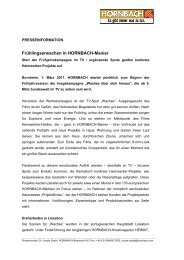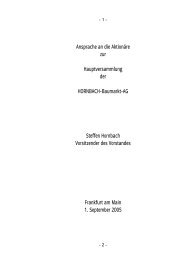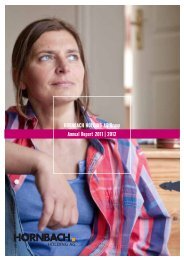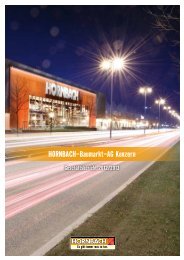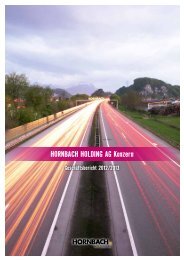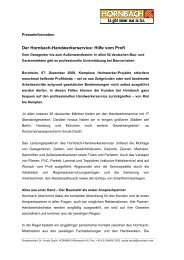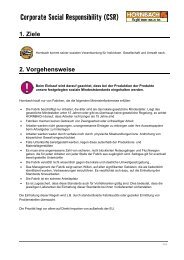Hornbach-Baumarkt-AG Group
PDF, 3,6 MB - Hornbach Holding AG
PDF, 3,6 MB - Hornbach Holding AG
- No tags were found...
Create successful ePaper yourself
Turn your PDF publications into a flip-book with our unique Google optimized e-Paper software.
68 GROUP MAN<strong>AG</strong>EMENT REPORT Risk Report<br />
Major changes to financial reporting processes due to new<br />
laws, legislative amendments or changes in internal processes<br />
are discussed prior to implementation at international<br />
finance conferences for all managers with significant involvement<br />
in the group financial reporting process. Specialist<br />
accounting or financial reporting issues and complex matters<br />
either involving particular risks or requiring special expertise<br />
are monitored and processed centrally. External experts, such<br />
as chartered surveyors, are drawn on in particular to assess<br />
the fair values of real estate in the context of impairment<br />
tests or to measure pension provisions.<br />
All significant processes relevant to financial reporting are<br />
uniformly portrayed across the <strong>Group</strong> in a common IT system<br />
for the overall <strong>Group</strong>. This complete integration of all major<br />
finance systems within a uniform IT system ensures the integrity<br />
of the data on which the separate and consolidated financial<br />
statements are based. In conjunction with the accounting<br />
handbook valid for the whole <strong>Group</strong>, the use of uniform account<br />
codes across the <strong>Group</strong> and central management of the<br />
account system ensure uniform accounting treatment of<br />
transactions of the same nature.<br />
This also serves as a basis for group consolidation in accordance<br />
with the relevant requirements. Consolidation measures<br />
and the necessary agreement activities are performed<br />
centrally by a consolidation department. The checks to be<br />
undertaken in the consolidation processes, such as the consolidation<br />
of liabilities, expenses or revenues, are performed<br />
both automatically by the system and manually.<br />
The risk of any system breakdown or loss of data is minimized<br />
by centrally managing and monitoring all significant IT systems<br />
involved in the financial reporting process and regularly<br />
performing system backups. As an integral component of the<br />
internal control system, within the framework of its activities<br />
the <strong>Group</strong> Internal Audit Department regularly audits the<br />
effectiveness of the internal control system in respect of the<br />
financial reporting process on the basis of trial samples<br />
reviewed in line with a risk-oriented audit plan. Alongside<br />
these internal audits, the external auditor also assesses the<br />
effectiveness of internal checks of relevance to the financial<br />
reporting process within the framework of its audit. Having<br />
said this, even suitable, functional systems cannot provide<br />
absolute certainty concerning the identification and management<br />
of risks.<br />
Financial risks<br />
The <strong>Group</strong>’s financial risks comprise foreign currency, interest<br />
rate, liquidity, and credit risks. Responsibility for managing<br />
these risks lies with the treasury department.<br />
Foreign currency risks<br />
In general, HORNBACH is exposed to foreign currency risks on<br />
account of its activities in countries with currencies other<br />
than the euro. Specifically, these involve Swiss francs, Czech<br />
crowns, Swedish crowns, and Romanian leis. Any depreciation<br />
in a foreign currency against the euro can lead to a reduction<br />
in consolidated earnings when translating the separate financial<br />
statements of foreign subsidiaries into euros, the <strong>Group</strong>’s<br />
currency. These risks are not hedged at the <strong>Group</strong>.<br />
Furthermore, the increasingly international business activities<br />
of the <strong>Group</strong> result in rising foreign currency requirements<br />
both for handling international procurement and for financing<br />
objects of investment in foreign currencies. Any change in the<br />
exchange rate between the respective national currency and<br />
the procurement currencies (chiefly EUR and USD) could have<br />
a direct negative impact on earnings. Open foreign currency<br />
positions in USD are largely secured by hedging transactions<br />
(forward exchange contracts and USD fixed-term deposits).<br />
Where possible, investments are financed in the functional<br />
currency of the respective country company (natural hedging).<br />
Open foreign currency positions arising at the <strong>Group</strong> in<br />
EUR, which mainly relate to intragroup deliveries and services<br />
invoiced in EUR and intragroup EUR loans, are not<br />
hedged.<br />
Interest rate risks<br />
Fixed-rate agreements or interest rate exchange agreements<br />
(interest swaps) have been concluded to secure the interest<br />
rates on existing non-current liabilities. The interest swaps



